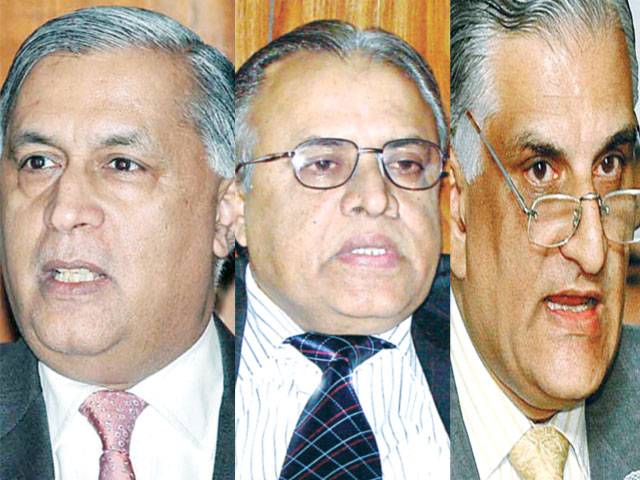ISLAMABAD - The Special Court on Friday accepted former military ruler Pervez Musharraf’s plea to include ex-PM Shaukat Aziz, former law minister Zahid Hamid and Justice (r) Abdul Hameed Dogar as co-accused in the high treason trial, directing the federal government to submit amended or additional statement and formal charges against them within a fortnight.
A three-member Special Court, comprising Justice Faisal Arab of Sindh High Court, Justice Tahira Safdar from Balochistan High Court and Justice Yawar Ali of Punjab High Court, passed the judgment with majority on former President Pervez Musharraf’s application. However, Justice Yawar Ali of LHC, differing with the other two judges, penned down a five-page dissenting note.
Pervez Musharraf, in his application, had prayed to the Special Court to dismiss the federal government’s complaint against him or implicate other persons who were part of the 3rd November action.
“The role of the ex-PM and former law minister falls within the ambit of the third charge, listed in the statement of charges filed by the federation, as according to the summary dated 3rd November 2007, they sat down on that very evening to process the removal of the then CJP (Justice Iftikhar Muhammad Chaudhry) and appointment of his successor,” the judgment added.
On the other hand, Justice Yawar Ali wrote, “There is no evidence on the record to establish that any person advised Musharraf, within the ambit of Article 48 of the Constitution, to impose the emergency.”
The majority judgment, authored by Justice Faisal Arab, stated: “Prime minister is empowered to advise the President to impose emergency. If he had not advised the President for the 3rd November action, then certainly his powers were usurped when the emergency was proclaimed and he did not show aversion to it. The law minister, who is supposed to be aware of legal consequence of PCO and Oath of Office (Judges) Order indulged in the process of removal and appointment of judges along with the PM.”
The judgment said had Justice (retd) Abdul Hameed Dogar not consented to become the CJP, he would not have been made the chief justice of Pakistan prior to the issuance of Provisional Constitution Order (PCO).
The court excluded names of ex-COAS Ashfaq Parvez Kayani, all the then governors of the four provinces, ex-chairman Joint Chief of Staff Committee, the then chiefs of armed forces, ex-vice COAS and the then corps commanders of army from the case, saying ‘except for engaging in a briefing, nothing else was attributed to them.’ About Kayani’s non-involvement in the 3rd November emergency, it stated: “By virtue of amendment in Article 6, the power to revoke emergency vests in the President, so the argument to implicate him in the case is not sustainable.”
Regarding the then cabinet members and the MNAs who passed the resolution in support of the emergency, the court noted that under the law only active complicity in the commission of a crime is an essential ingredient which makes a person accessory to the crime. “Since mere endorsement lacks this basic ingredient, it cannot be treated as an act of abetment,” the order stated.
The court observed that on 3rd November 2007 Musharraf issued three orders – Proclamation of Emergency, Provisional Constitution Order and Oath of Office (Judges) Order. He issued the first two orders as chief of the army staff, while the third one was issued as President of Pakistan, the court observed and added he held the Constitution in abeyance by imposing the emergency.
Saturday, April 20, 2024
Court orders trial of Mush abettors
| Former COAS Kayani, other top military brass exonerated

Pak economy improving, funds will be provided on request: IMF
9:57 PM | April 19, 2024
Minister advocates for IT growth with public-private collaboration
9:57 PM | April 19, 2024
Judges' letter: IHC seeks suggestions from all judges
9:55 PM | April 19, 2024
Formula 1 returns to China for Round 5
9:05 PM | April 19, 2024
Germany head coach Julian Nagelsmann extends contract till 2026 World Cup
9:00 PM | April 19, 2024
A Tense Neighbourhood
April 19, 2024
Dubai Underwater
April 19, 2024
X Debate Continues
April 19, 2024
Hepatitis Challenge
April 18, 2024
IMF Predictions
April 18, 2024
Kite tragedy
April 19, 2024
Discipline dilemma
April 19, 2024
Urgent plea
April 19, 2024
Justice denied
April 18, 2024
AI dilemmas unveiled
April 18, 2024
ePaper - Nawaiwaqt
Advertisement
Nawaiwaqt Group | Copyright © 2024





